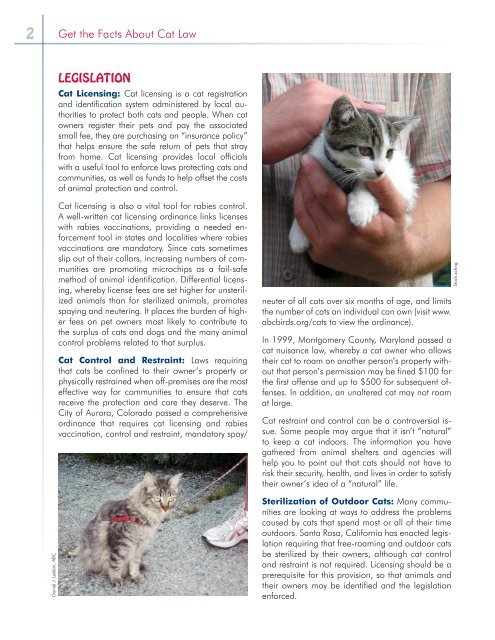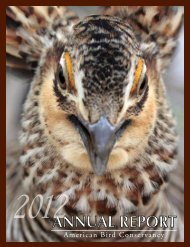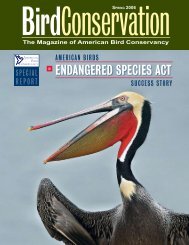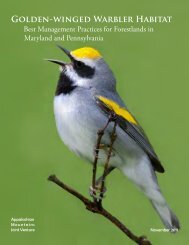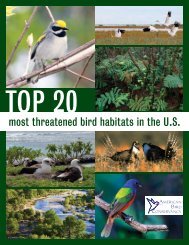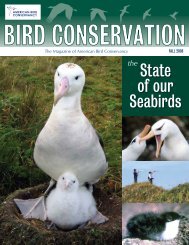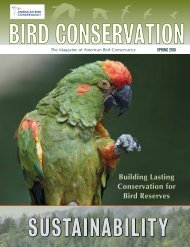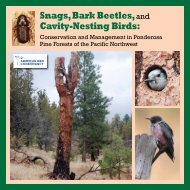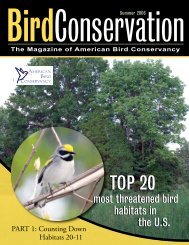Getting the Facts About Cat Law - American Bird Conservancy
Getting the Facts About Cat Law - American Bird Conservancy
Getting the Facts About Cat Law - American Bird Conservancy
Create successful ePaper yourself
Turn your PDF publications into a flip-book with our unique Google optimized e-Paper software.
2Get <strong>the</strong> <strong>Facts</strong> <strong>About</strong> <strong>Cat</strong> <strong>Law</strong>LEGISLATION<strong>Cat</strong> Licensing: <strong>Cat</strong> licensing is a cat registrationand identification system administered by local authoritiesto protect both cats and people. When catowners register <strong>the</strong>ir pets and pay <strong>the</strong> associatedsmall fee, <strong>the</strong>y are purchasing an “insurance policy”that helps ensure <strong>the</strong> safe return of pets that strayfrom home. <strong>Cat</strong> licensing provides local officialswith a useful tool to enforce laws protecting cats andcommunities, as well as funds to help offset <strong>the</strong> costsof animal protection and control.Daniel J. Lebbin, ABC<strong>Cat</strong> licensing is also a vital tool for rabies control.A well-written cat licensing ordinance links licenseswith rabies vaccinations, providing a needed enforcementtool in states and localities where rabiesvaccinations are mandatory. Since cats sometimesslip out of <strong>the</strong>ir collars, increasing numbers of communitiesare promoting microchips as a fail-safemethod of animal identification. Differential licensing,whereby license fees are set higher for unsterilizedanimals than for sterilized animals, promotesspaying and neutering. It places <strong>the</strong> burden of higherfees on pet owners most likely to contribute to<strong>the</strong> surplus of cats and dogs and <strong>the</strong> many animalcontrol problems related to that surplus.<strong>Cat</strong> Control and Restraint: <strong>Law</strong>s requiringthat cats be confined to <strong>the</strong>ir owner’s property orphysically restrained when off-premises are <strong>the</strong> mosteffective way for communities to ensure that catsreceive <strong>the</strong> protection and care <strong>the</strong>y deserve. TheCity of Aurora, Colorado passed a comprehensiveordinance that requires cat licensing and rabiesvaccination, control and restraint, mandatory spay/neuter of all cats over six months of age, and limits<strong>the</strong> number of cats an individual can own (visit www.abcbirds.org/cats to view <strong>the</strong> ordinance).In 1999, Montgomery County, Maryland passed acat nuisance law, whereby a cat owner who allows<strong>the</strong>ir cat to roam on ano<strong>the</strong>r person’s property withoutthat person’s permission may be fined $100 for<strong>the</strong> first offense and up to $500 for subsequent offenses.In addition, an unaltered cat may not roamat large.<strong>Cat</strong> restraint and control can be a controversial issue.Some people may argue that it isn’t “natural”to keep a cat indoors. The information you havega<strong>the</strong>red from animal shelters and agencies willhelp you to point out that cats should not have torisk <strong>the</strong>ir security, health, and lives in order to satisfy<strong>the</strong>ir owner’s idea of a “natural” life.Sterilization of Outdoor <strong>Cat</strong>s: Many communitiesare looking at ways to address <strong>the</strong> problemscaused by cats that spend most or all of <strong>the</strong>ir timeoutdoors. Santa Rosa, California has enacted legislationrequiring that free-roaming and outdoor catsbe sterilized by <strong>the</strong>ir owners, although cat controland restraint is not required. Licensing should be aprerequisite for this provision, so that animals and<strong>the</strong>ir owners may be identified and <strong>the</strong> legislationenforced.Stock.xchng


